20 years later — Senator Joyal remains committed to moving Canada forward
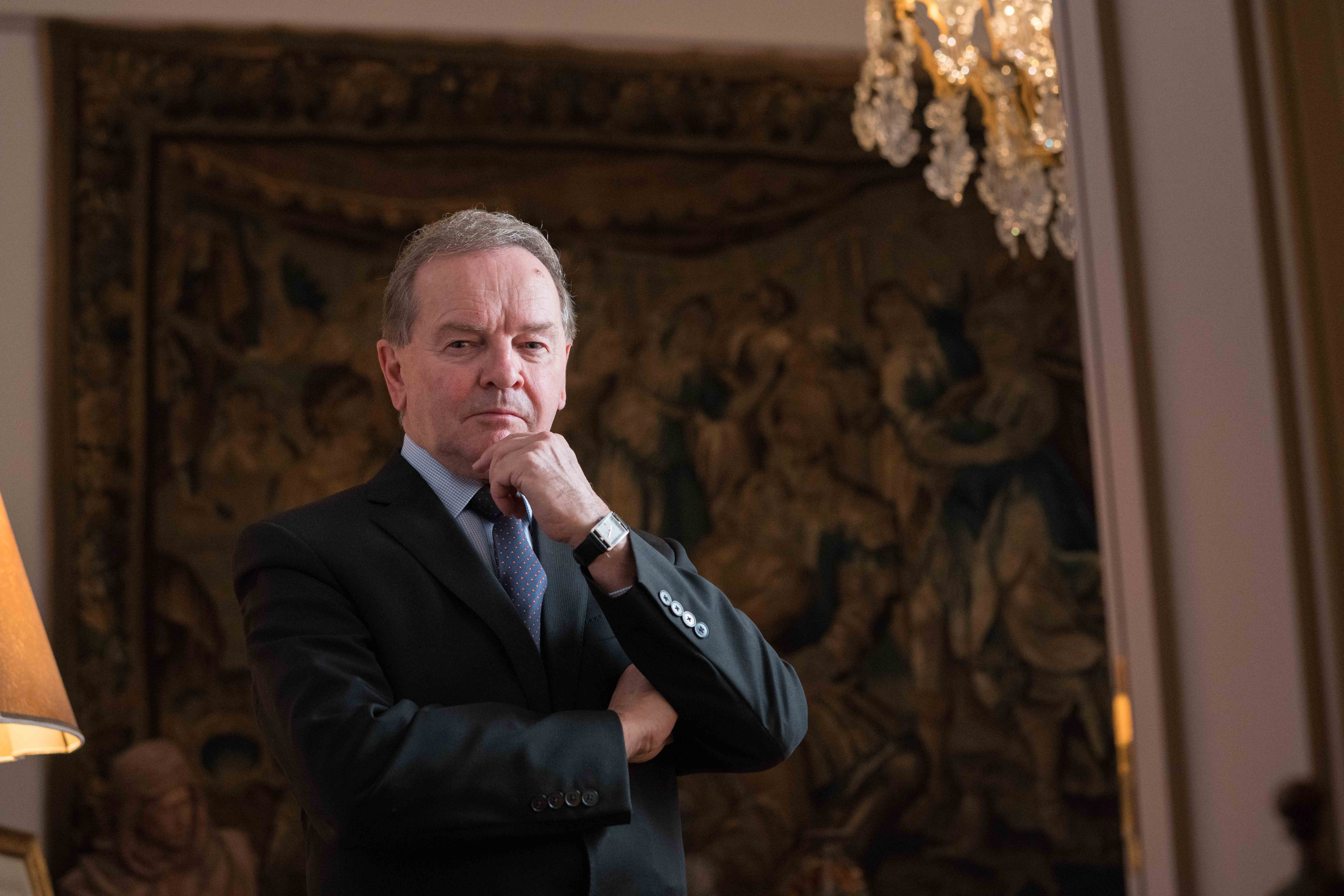
Note to readers: The Honourable Serge Joyal, P.C., retired from the Senate of Canada in February, 2020. Learn more about his work in Parliament.
Born in Montreal, Senator Serge Joyal entered politics as a Liberal Member of Parliament in 1974. He later became a minister in prime minister Pierre Elliott Trudeau’s cabinet.
In the early 1980s, he held the positions of parliamentary secretary to the President of the Treasury Board, minister of state and secretary of state of Canada. He founded the Standing Joint Committee on Official Languages and was chair of the Special Joint Committee on the Constitution of Canada, which was tasked with reviewing the original draft of the Canadian Charter of Rights and Freedoms.
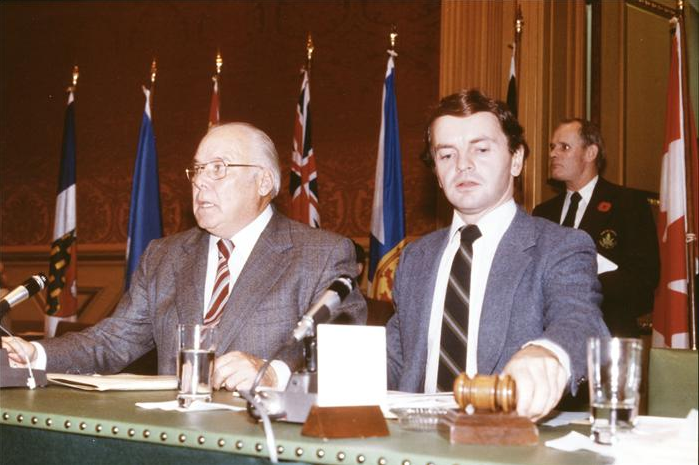
In 1997, Serge Joyal was recommended to the Senate of Canada by prime minister Jean Chrétien.
An art collector and patron, he has also published several books and articles relating to legal, historical or cultural policy matters, and he is a fierce advocate for the French language.
How would you compare your 20 years in the Senate to your previous political work as an MP?
By profession I’m a jurist. I take great interest in understanding the law, focusing on both its implementation as well as the transformative impact it will have on society in the long term. So I was convinced that the Senate would provide an opportunity to further commit myself to issues of that nature. For me, first and foremost, that meant continuing my commitment of advancing the implementation of the Charter of Rights and Freedoms.
I had great satisfaction in being an elected member. However, having an appointed Senate seat offers greater independence. Governments or prime ministers or hot-button issues of the day change, but the defence of my objectives remains my primary commitment. The Senate has allowed me to make use of my experience and knowledge, similar to how a cook practises his or her craft, creating a recipe, balancing the ingredients. Developing a methodology of thinking while broadening the subject matter of our interventions over the years, we are able to accumulate wisdom and real experience, and are better able to master the subject matter.
Looking back, how do you think this chapter in Canadian history will be defined?
Definitely, I think it will be about the Charter of Rights and Freedoms.
The Charter is now being fully integrated into the definition of who we are as citizens. Canadians have made the Charter their own. They know they have rights and freedoms, that courts are independent and that complaints can be taken to court. They can sue their own government, as I’ve done in the past. In fact, I’m currently before the Supreme Court as well, regarding an issue of parliamentary privilege involving the Speaker of the Legislative Assembly of Quebec.
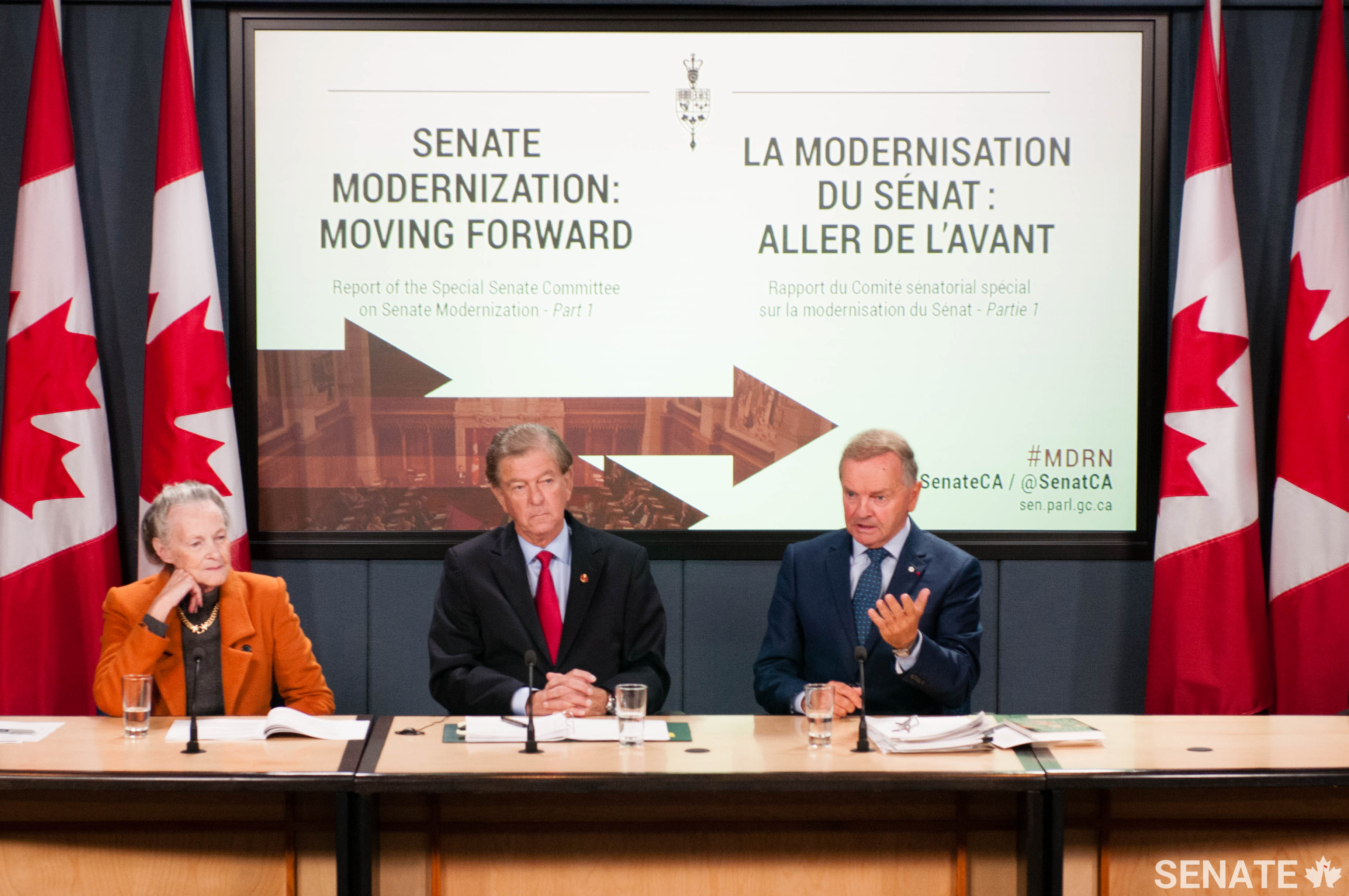
In your time at the Senate, have you encountered other parliamentarians who have engaged actively in the court system as well?
I don’t think so. It is quite unusual that a sitting parliamentarian votes on legislation and then defends or challenges it in court. I use every instrument in my toolbox. I remember debating an article of the Charter with a witness at the Senate Committee on Legal and Constitutional Affairs and, given our disagreement, in the end ultimately said: “see you in court.”
I did this also as an MP. I sued prime minister Pierre Trudeau’s government even while I was in his caucus. For two years he didn’t speak to me, but later we became friends again. I was charged with the review of the Charter project in 1980, and later entered the Cabinet. So it is not because you fight for your principles that you necessarily make sworn enemies. People respect someone who stands up for his or her ideas and values.
Can you mention any legislation or issues you’ve spoken to recently?
I recently spoke on Bill C-25, which aims to create gender-balanced corporate boards in Canada. As you know, it was only recently that women really shattered the glass ceiling in politics, by becoming premiers in Prince Edward Island, Quebec, Ontario, British Columbia and Alberta.
Still, much remains to be done. For instance, Bombardier was building the C Series airplane with mainly men on its board. They claimed their business model required that imbalance. Then, they sold the rights to Airbus in Europe, and suddenly 50% of the board of directors were women, since it is the law in those countries. But it is exactly the same product! Why is that acceptable in Europe — in Germany, France and the Netherlands — but not here?
It has been 50 years since the Royal Commission on the Status of Women said that women must also be at the top of economic power. Well, when a bill pops up that affords you the opportunity to advance and promote this objective, you just jump on the ice and try to score, i.e. to amend a bill so that, as a society, gender equality is better respected and implemented.
The continued exclusion of Aboriginal peoples is another issue we need to address vigorously, and head-on.
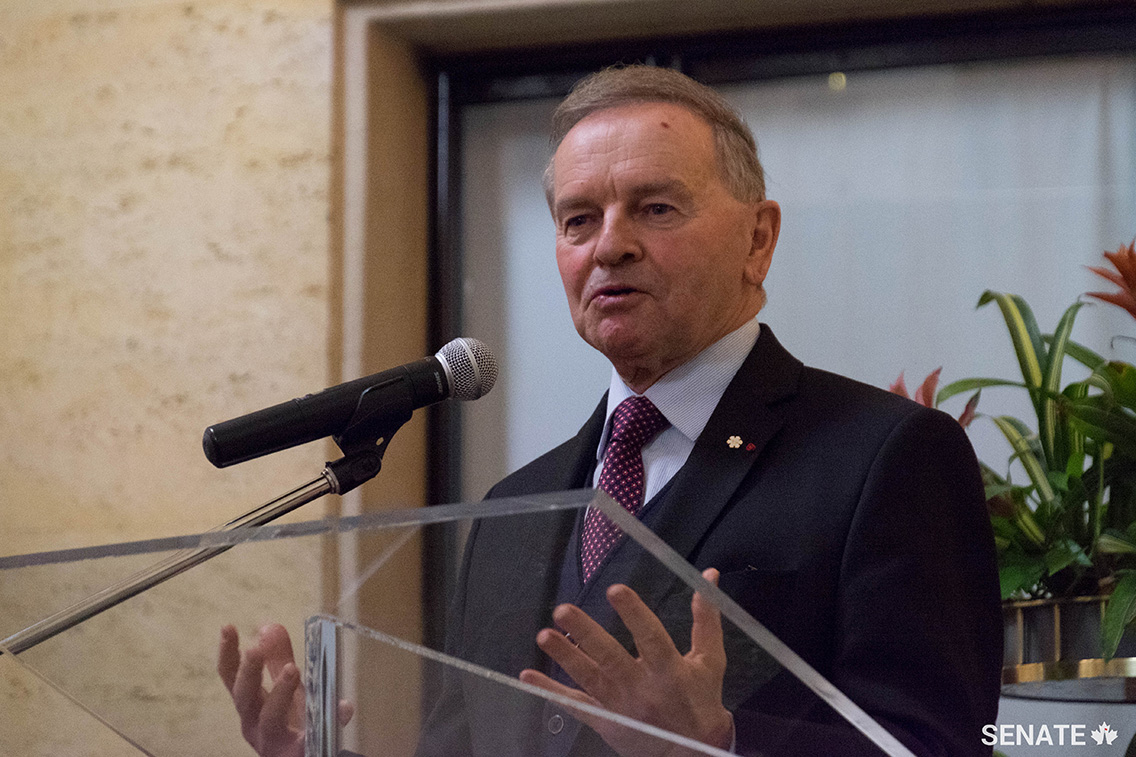
Should the Government of Canada pardon Louis Riel?
Yes. I actually commissioned a work of art featuring Louis Riel and it is displayed in the Aboriginal Peoples Room in Parliament! When I chaired the Charter committee, I also pushed for Métis to be included in the definition of Aboriginal peoples in the Constitution.
I completely sympathize with the Aboriginal cause. We are blessed to have a connection with these peoples. Moreover, the ongoing reconciliation which is now necessary fits right in with our federal tradition, that is, of creating a space and society where different peoples, two official languages, Aboriginal languages, and various diverse cultures can coexist.
One of the objectives has to be re-establishing the use of Aboriginal languages: as you know, I am who I am because I speak French. If you don’t master your own language, it is difficult to define your identity, your ancestral roots, your spirituality, your imagination, and your way of seeing the world.
I also think Aboriginal peoples should actually become masters on their own territory. As long as we’re trying to bypass this question, nothing will change. They must become sovereign on their own territory. That would reinstate the dignity that was taken from them following the settlement of Europeans colonists.
This is certainly a new model for sovereignty that we will need to invent, and we’ll probably do so in the British rather than the French manner — we won’t devise some theoretically perfect system: it will happen incrementally, by addressing contemporary issues individually and by finding reasonable solutions as we progress forward. The key is to have a clear direction and dedication.
What will you spend your final two years in the Senate working on?
I think the rise of populism today is something we need to take a deep look at. The Senate can offer thoughtful deliberation on this during these internationally turbulent times. Senators will need to reflect deeply on the growing vulnerability of the democratic institutions experienced by our traditional partners, the United States, Great Britain, France, and other European nations.
MPs derive legitimacy directly from the people. One false Internet comment, piece of inaccurate news, or allegation that reflects badly on you can jeopardize one’s otherwise honest undertakings; we have yet to find a way to counter-balance this situation because, as a result, democracy is becoming vulnerable. One need only look at the Russia investigation and the propagation of manipulative information south of the border. Who says Russia won’t try to do the same to Canada during the next election?
I think we’re skating on thin ice. We’re just starting to realize how destructive this can be on our value systems and principles.
Thus, we need to organize and open a public debate on this challenge. That’s how you get the demons and evil genies out of the bottle — through open discussion. The system must be made aware that we are facing an unprecedented problem.
As such, I’m in the early stages of developing a Senate forum for discussing this rise in populism. We won’t solve everything, but we can start the conversation to better understand and confront the challenges that undermine our values of liberty, equality and dignity.
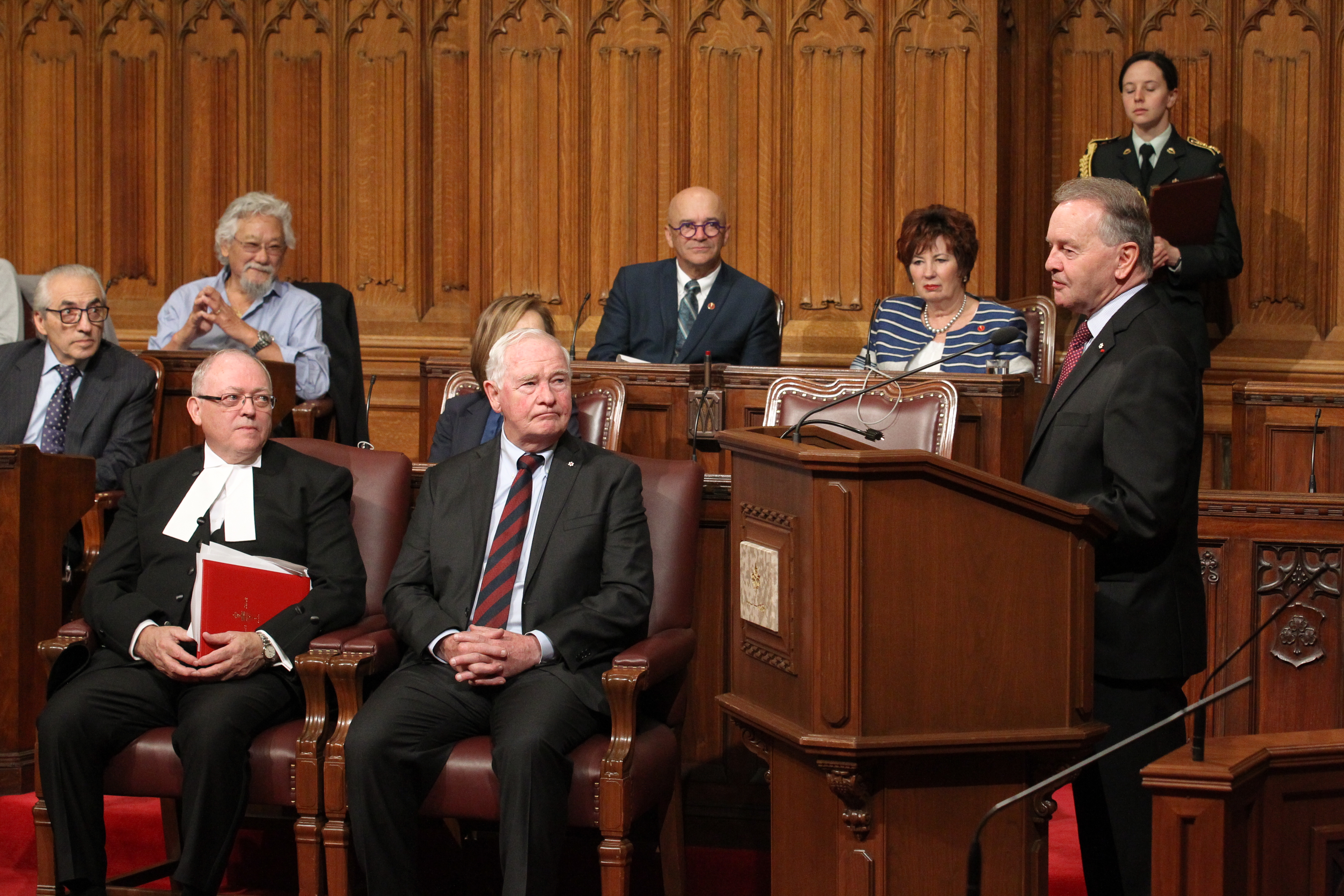
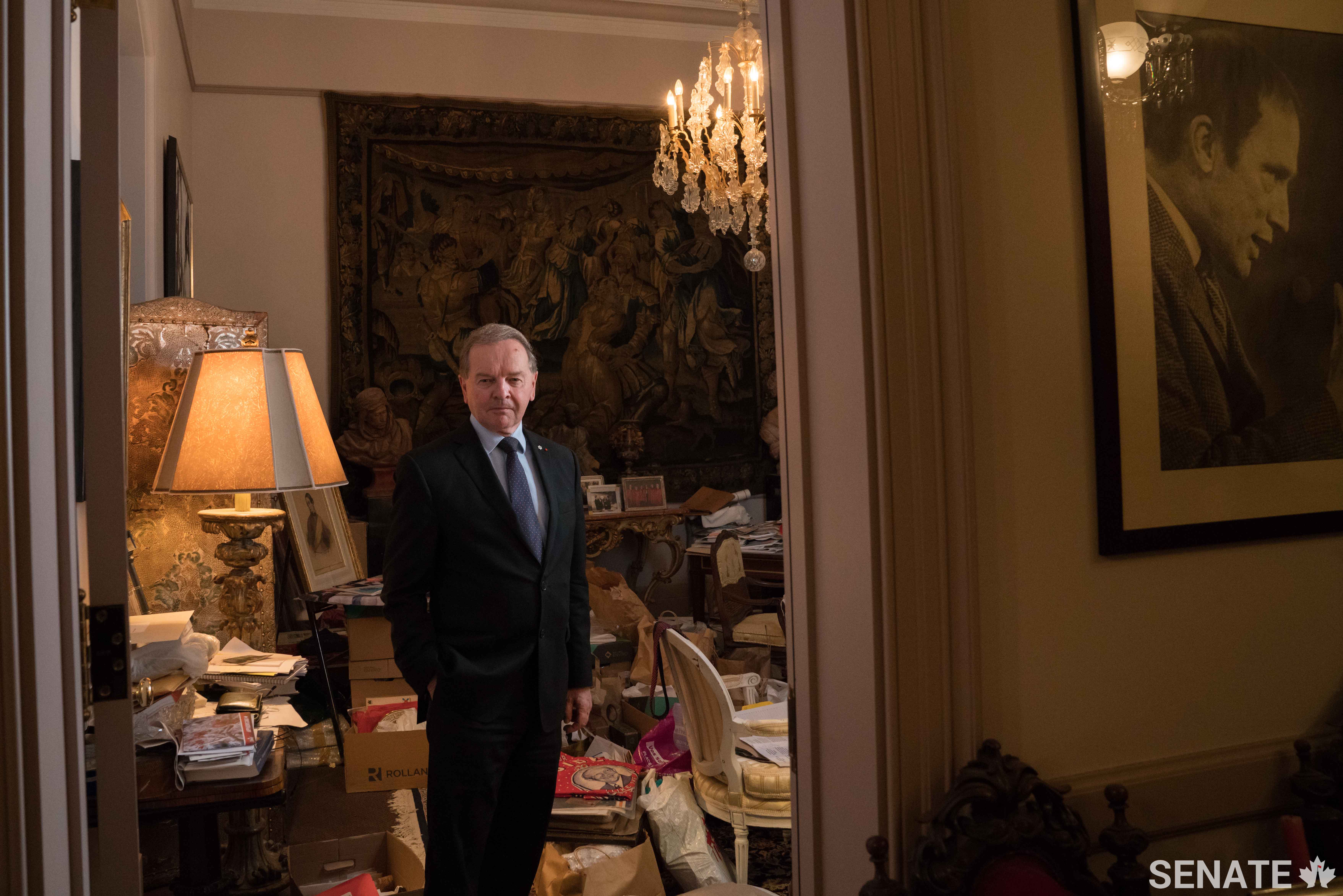
Note to readers: The Honourable Serge Joyal retired from the Senate of Canada in January, 2020. Learn more about his work in Parliament.
Related articles
Tags
Committee news
20 years later — Senator Joyal remains committed to moving Canada forward

Note to readers: The Honourable Serge Joyal, P.C., retired from the Senate of Canada in February, 2020. Learn more about his work in Parliament.
Born in Montreal, Senator Serge Joyal entered politics as a Liberal Member of Parliament in 1974. He later became a minister in prime minister Pierre Elliott Trudeau’s cabinet.
In the early 1980s, he held the positions of parliamentary secretary to the President of the Treasury Board, minister of state and secretary of state of Canada. He founded the Standing Joint Committee on Official Languages and was chair of the Special Joint Committee on the Constitution of Canada, which was tasked with reviewing the original draft of the Canadian Charter of Rights and Freedoms.

In 1997, Serge Joyal was recommended to the Senate of Canada by prime minister Jean Chrétien.
An art collector and patron, he has also published several books and articles relating to legal, historical or cultural policy matters, and he is a fierce advocate for the French language.
How would you compare your 20 years in the Senate to your previous political work as an MP?
By profession I’m a jurist. I take great interest in understanding the law, focusing on both its implementation as well as the transformative impact it will have on society in the long term. So I was convinced that the Senate would provide an opportunity to further commit myself to issues of that nature. For me, first and foremost, that meant continuing my commitment of advancing the implementation of the Charter of Rights and Freedoms.
I had great satisfaction in being an elected member. However, having an appointed Senate seat offers greater independence. Governments or prime ministers or hot-button issues of the day change, but the defence of my objectives remains my primary commitment. The Senate has allowed me to make use of my experience and knowledge, similar to how a cook practises his or her craft, creating a recipe, balancing the ingredients. Developing a methodology of thinking while broadening the subject matter of our interventions over the years, we are able to accumulate wisdom and real experience, and are better able to master the subject matter.
Looking back, how do you think this chapter in Canadian history will be defined?
Definitely, I think it will be about the Charter of Rights and Freedoms.
The Charter is now being fully integrated into the definition of who we are as citizens. Canadians have made the Charter their own. They know they have rights and freedoms, that courts are independent and that complaints can be taken to court. They can sue their own government, as I’ve done in the past. In fact, I’m currently before the Supreme Court as well, regarding an issue of parliamentary privilege involving the Speaker of the Legislative Assembly of Quebec.

In your time at the Senate, have you encountered other parliamentarians who have engaged actively in the court system as well?
I don’t think so. It is quite unusual that a sitting parliamentarian votes on legislation and then defends or challenges it in court. I use every instrument in my toolbox. I remember debating an article of the Charter with a witness at the Senate Committee on Legal and Constitutional Affairs and, given our disagreement, in the end ultimately said: “see you in court.”
I did this also as an MP. I sued prime minister Pierre Trudeau’s government even while I was in his caucus. For two years he didn’t speak to me, but later we became friends again. I was charged with the review of the Charter project in 1980, and later entered the Cabinet. So it is not because you fight for your principles that you necessarily make sworn enemies. People respect someone who stands up for his or her ideas and values.
Can you mention any legislation or issues you’ve spoken to recently?
I recently spoke on Bill C-25, which aims to create gender-balanced corporate boards in Canada. As you know, it was only recently that women really shattered the glass ceiling in politics, by becoming premiers in Prince Edward Island, Quebec, Ontario, British Columbia and Alberta.
Still, much remains to be done. For instance, Bombardier was building the C Series airplane with mainly men on its board. They claimed their business model required that imbalance. Then, they sold the rights to Airbus in Europe, and suddenly 50% of the board of directors were women, since it is the law in those countries. But it is exactly the same product! Why is that acceptable in Europe — in Germany, France and the Netherlands — but not here?
It has been 50 years since the Royal Commission on the Status of Women said that women must also be at the top of economic power. Well, when a bill pops up that affords you the opportunity to advance and promote this objective, you just jump on the ice and try to score, i.e. to amend a bill so that, as a society, gender equality is better respected and implemented.
The continued exclusion of Aboriginal peoples is another issue we need to address vigorously, and head-on.

Should the Government of Canada pardon Louis Riel?
Yes. I actually commissioned a work of art featuring Louis Riel and it is displayed in the Aboriginal Peoples Room in Parliament! When I chaired the Charter committee, I also pushed for Métis to be included in the definition of Aboriginal peoples in the Constitution.
I completely sympathize with the Aboriginal cause. We are blessed to have a connection with these peoples. Moreover, the ongoing reconciliation which is now necessary fits right in with our federal tradition, that is, of creating a space and society where different peoples, two official languages, Aboriginal languages, and various diverse cultures can coexist.
One of the objectives has to be re-establishing the use of Aboriginal languages: as you know, I am who I am because I speak French. If you don’t master your own language, it is difficult to define your identity, your ancestral roots, your spirituality, your imagination, and your way of seeing the world.
I also think Aboriginal peoples should actually become masters on their own territory. As long as we’re trying to bypass this question, nothing will change. They must become sovereign on their own territory. That would reinstate the dignity that was taken from them following the settlement of Europeans colonists.
This is certainly a new model for sovereignty that we will need to invent, and we’ll probably do so in the British rather than the French manner — we won’t devise some theoretically perfect system: it will happen incrementally, by addressing contemporary issues individually and by finding reasonable solutions as we progress forward. The key is to have a clear direction and dedication.
What will you spend your final two years in the Senate working on?
I think the rise of populism today is something we need to take a deep look at. The Senate can offer thoughtful deliberation on this during these internationally turbulent times. Senators will need to reflect deeply on the growing vulnerability of the democratic institutions experienced by our traditional partners, the United States, Great Britain, France, and other European nations.
MPs derive legitimacy directly from the people. One false Internet comment, piece of inaccurate news, or allegation that reflects badly on you can jeopardize one’s otherwise honest undertakings; we have yet to find a way to counter-balance this situation because, as a result, democracy is becoming vulnerable. One need only look at the Russia investigation and the propagation of manipulative information south of the border. Who says Russia won’t try to do the same to Canada during the next election?
I think we’re skating on thin ice. We’re just starting to realize how destructive this can be on our value systems and principles.
Thus, we need to organize and open a public debate on this challenge. That’s how you get the demons and evil genies out of the bottle — through open discussion. The system must be made aware that we are facing an unprecedented problem.
As such, I’m in the early stages of developing a Senate forum for discussing this rise in populism. We won’t solve everything, but we can start the conversation to better understand and confront the challenges that undermine our values of liberty, equality and dignity.


Note to readers: The Honourable Serge Joyal retired from the Senate of Canada in January, 2020. Learn more about his work in Parliament.


